Data Engineer Salary and Career Prospects in 2022 and Beyond

 Written by:
Written by:Nathan Rosidi
Is it worth becoming a data engineer? We’ll have a thorough look at it in this article, including a detailed breakdown of data engineering salary in 2022.
Ah, the data engineers! One of the least fancy data professionals. Not because them not being important but because they are being misunderstood and not given enough credit. They for sure know their value and have a hell lot of technical skills. Luckily, companies have begun to understand the importance of a quality data engineer. They finally realized not everybody working with data can do data engineering.
As data gets more complicated and tools for processing it more sophisticated, data engineers start to get their deserved credit.
This is only fair, considering that most data professionals depend on the work done by data engineers.
So what is it that they actually do to be such an essential clog in data management?
What Does a Data Engineer Do?

In general, a data engineer’s role is to be a data provider in the sense that they ensure data is available to and usable by other users.
This breaks down the position into three distinct data engineering tasks:
- Building a company’s data pipeline
- Maintaining a company’s data pipeline
- Wrangling data
Data pipeline is a set of steps, tools, and processes that have the purpose of moving data from one or more sources to the storage system, where it will be handled further. Data pipeline usually involves ETL, which is short for extracting, transforming, and loading data.
Building a data pipeline means building a whole system that will automate this process of moving data to the greatest possible extent. To do that, data engineers will use software engineering techniques.
What was built has to be maintained to fulfill its purpose. In other words, data pipelines have to be improved and updated. It’s because technologies change, data changes, and business requirements change. This requires data engineers to have DevOps engineering skills, too.
There’s no point in having a great data pipeline if the data itself is rubbish. Data engineers clean and manipulate data to ensure its high quality and suitability for usage by other data professionals, which requires data analytics skills.
Data Engineer Salary: How Much Do They Make?
The latest data from Glassdoor shows that, in the US, data engineers earn a median salary of $94,150 a year.
This is the base salary, and with the added median bonus of $17,336, the total median salary is $111,486.
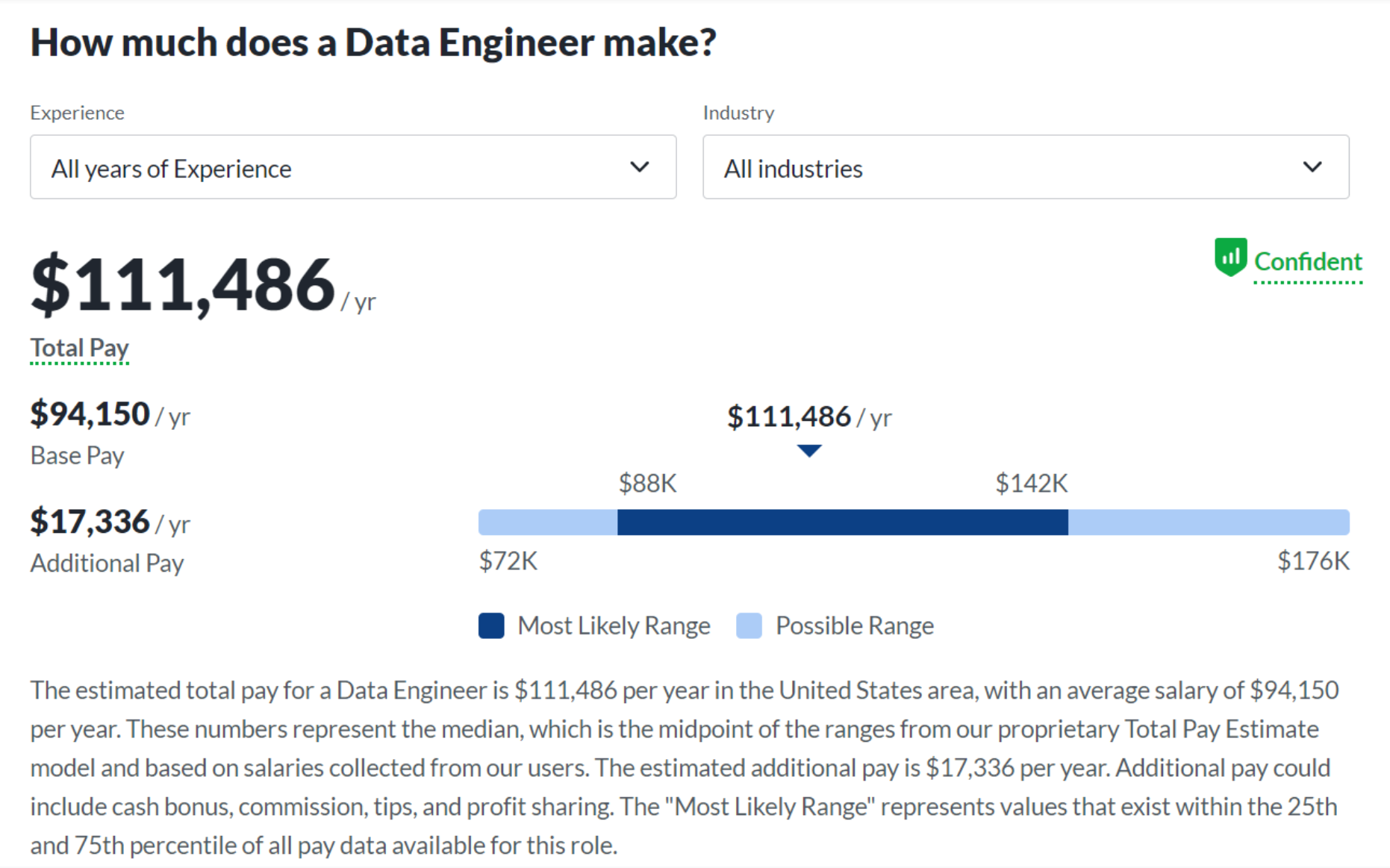
Most data engineers will earn somewhere between $88k and $142k.
What about other workers in the US? The average median weekly earnings in 3Q2022 in the US were $1,070. This is $55,640 yearly.
It seems that even the lowest-earning data engineers earn much more than that. Data engineers get paid more than double the national average when comparing the median salary.
What also has to be counted in is that companies need data engineers, so they have to treat them nicely. Aside from the cash bonus or profit sharing, there are plenty of benefits data engineers usually have plenty of other benefits.
These benefits, of course, depend on the company. They will usually include health and other insurances, retirement plans and stock options, parenting and medical leave, paid holidays and sick days, and some perks & discounts (gym membership, product discounts, etc.)
In further analysis of salaries, we’ll stick to the Glassdoor data.
Data Engineer Salaries vs. Other Data Professionals
The chart below shows data engineers are amongst the top half highest-paid data professionals.
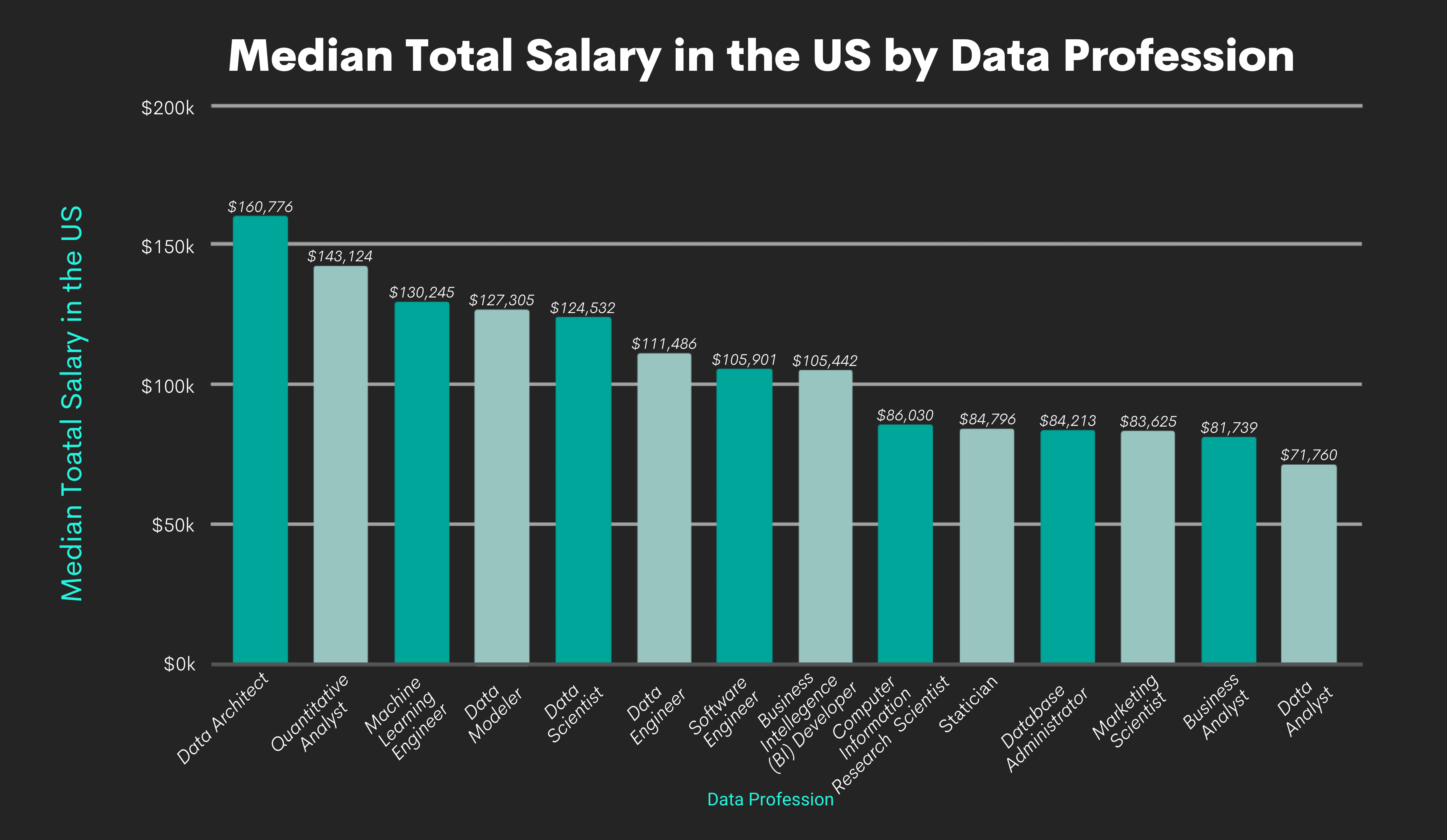
To be more accurate, they are the sixth highest-paid of the 14 professions. So much of being underestimated and not recognized!
Compared with the highest-paying job of data architects, data engineers are paid 44% less. But also their salary is 55% higher than the data analysts, the lowest-paid bunch. The data scientist salary is higher than the data engineers’. Maybe that’s where all this animosity comes from.
Data Engineer Salaries by Experience
One of the factors influencing the salary are the years of experience.
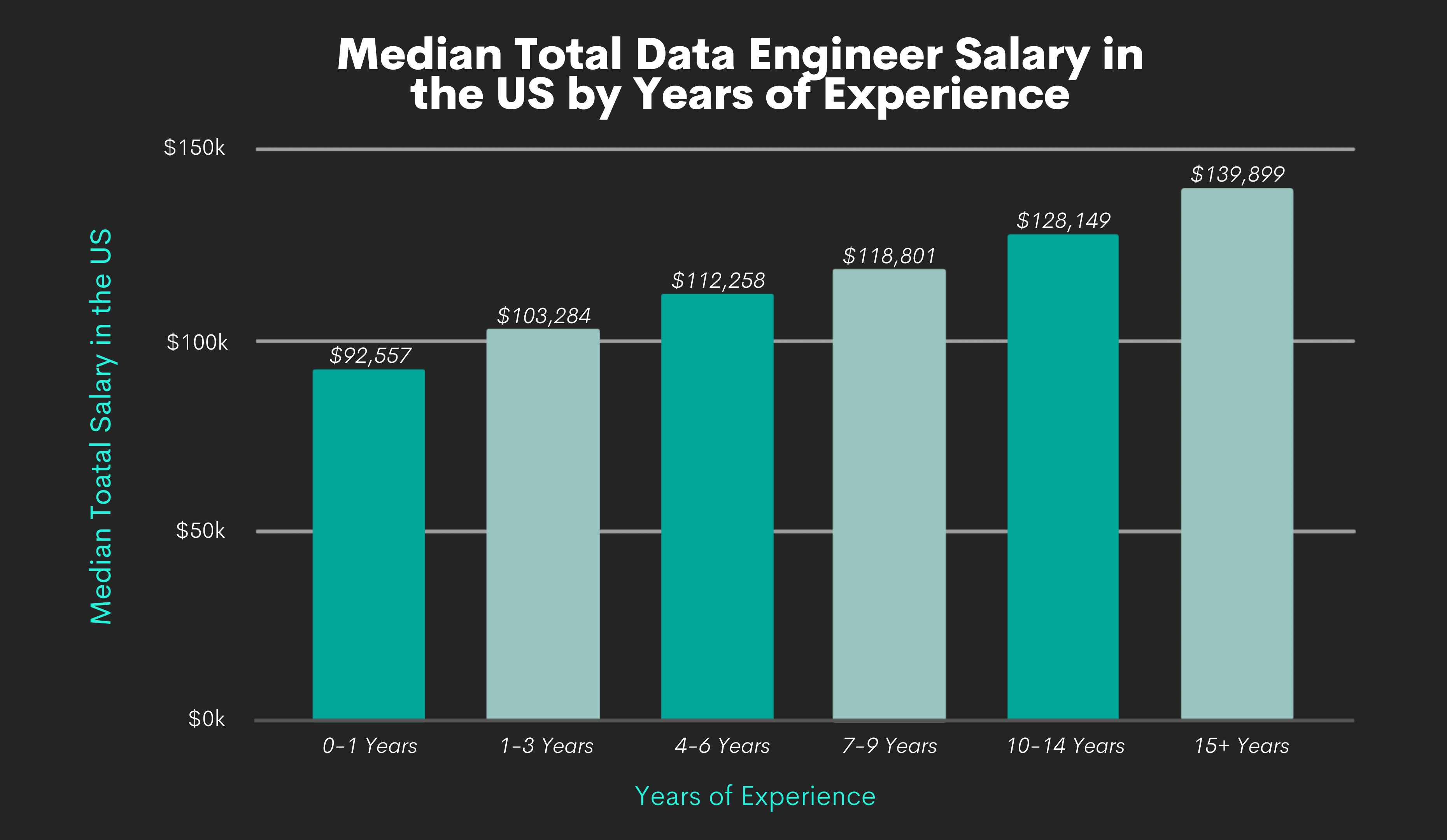
The most significant jumps of more than $10,000 are between the first and the third year, and with more than 15 years of experience.
In between, there’s, on average, an increase of around $3-4k for each year of experience.
The median salary for the highest-experience professionals is $139,899. But with that amount of experience, the most likely salary range goes up to $175k. While it’s not very likely it’s also not impossible to get a salary of $213k or even more.
Data Engineer Salaries by Industries
Another important factor that affects your salary is the industry you work in. Let’s first have a look at the highest-paying industries.
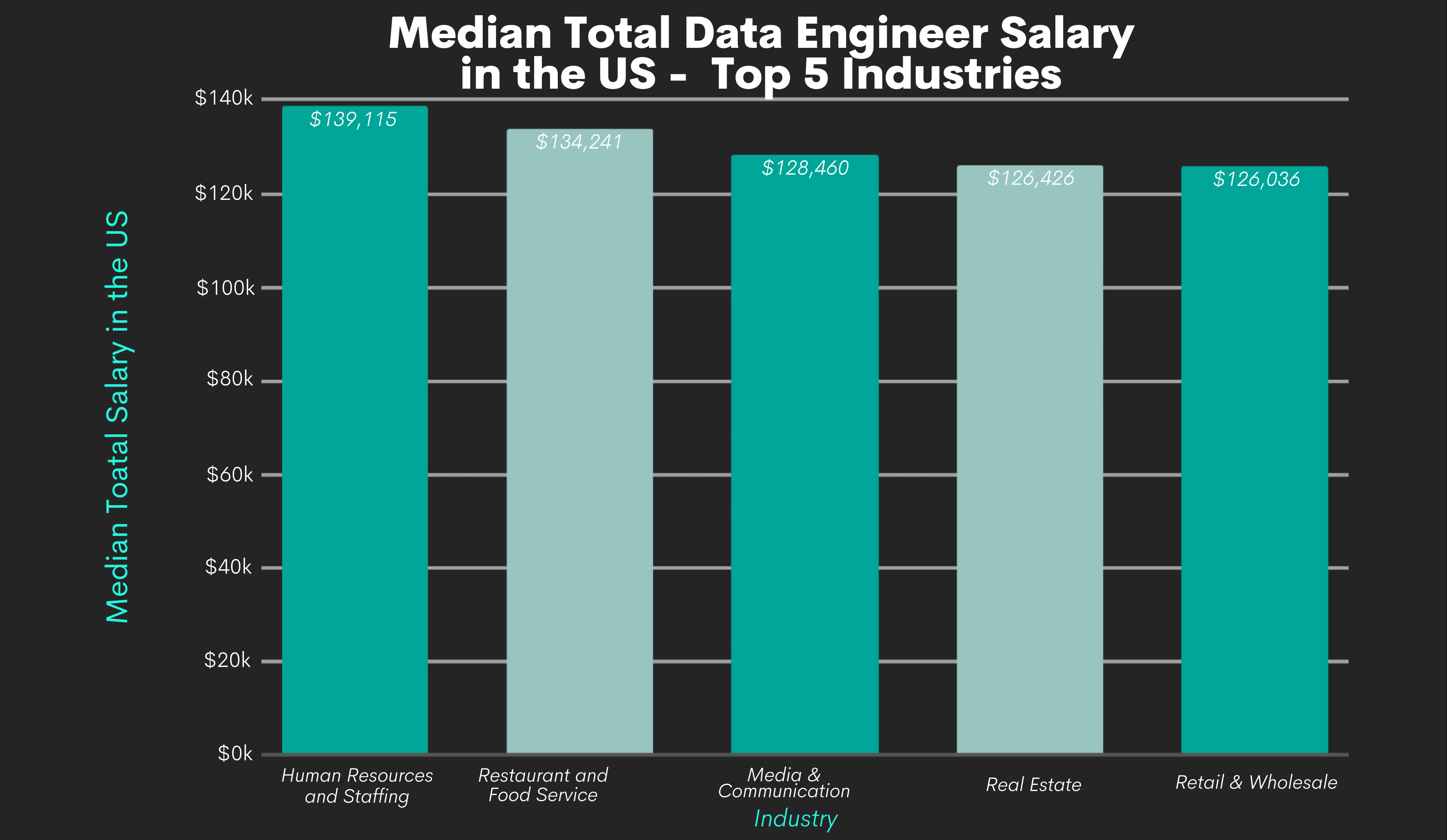
If you’re interested in earning the highest salary, then Human Resources & Staffing is your industry. It’s top paying with a $139,115 salary. Not that significantly lower is Restaurants & Food Service with $134,241.
The other three top-paying industries for data engineers are Media & Communication; Real Estate; Retail & Wholesale.
This is the median salary. Let’s see what salary ranges offer these industries.
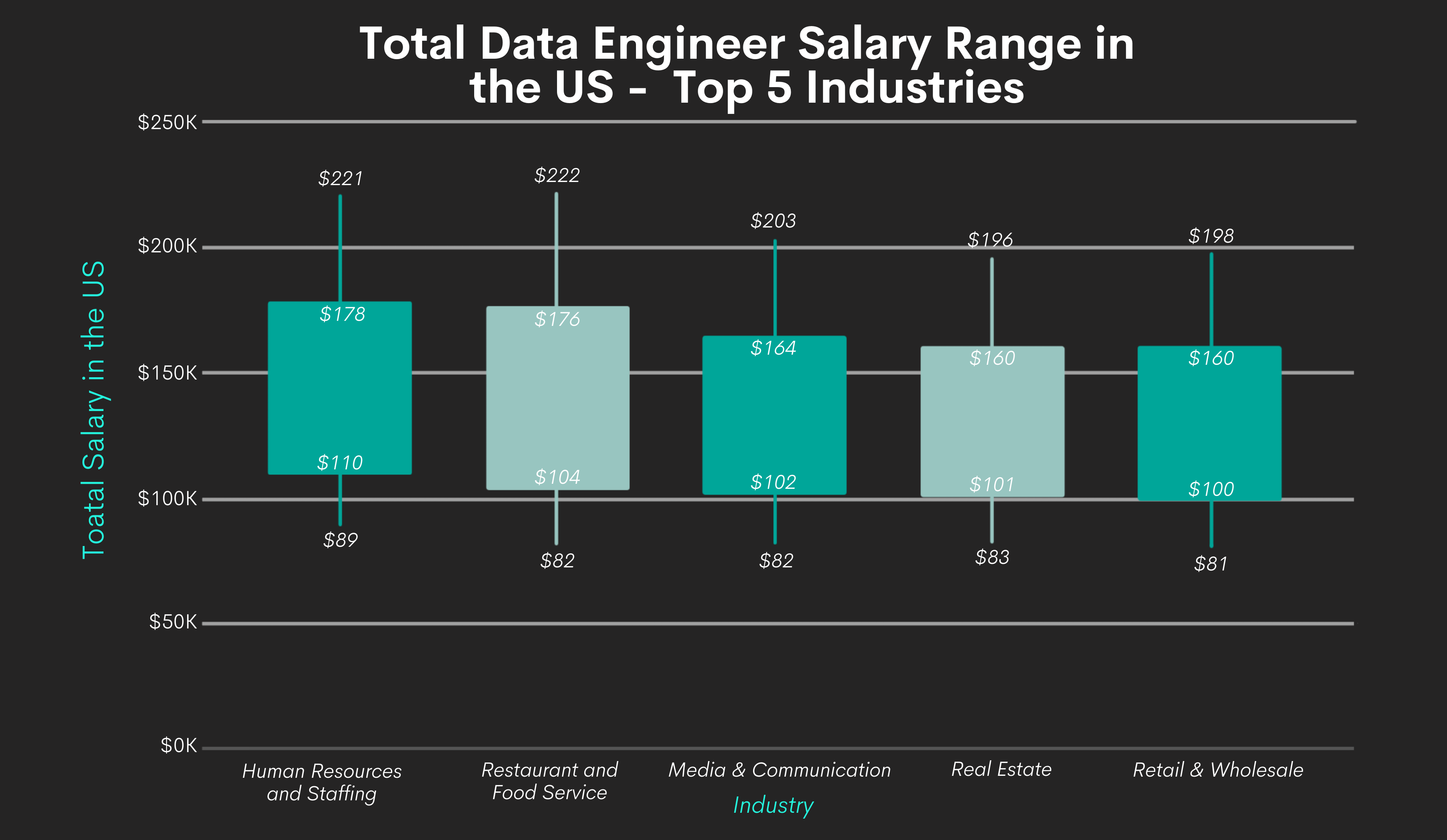
Generally, data changes as expected: the salary range becomes narrower as we move toward the lower-paying industries.
The only somewhat surprising insights are about the Restaurants & Foods Service having a slightly higher top end than Human Resources & Staffing. Also, the top of the salary range is somewhat higher in Retail & Wholesale than in Real Estate.
Now, the lowest-paying industries.
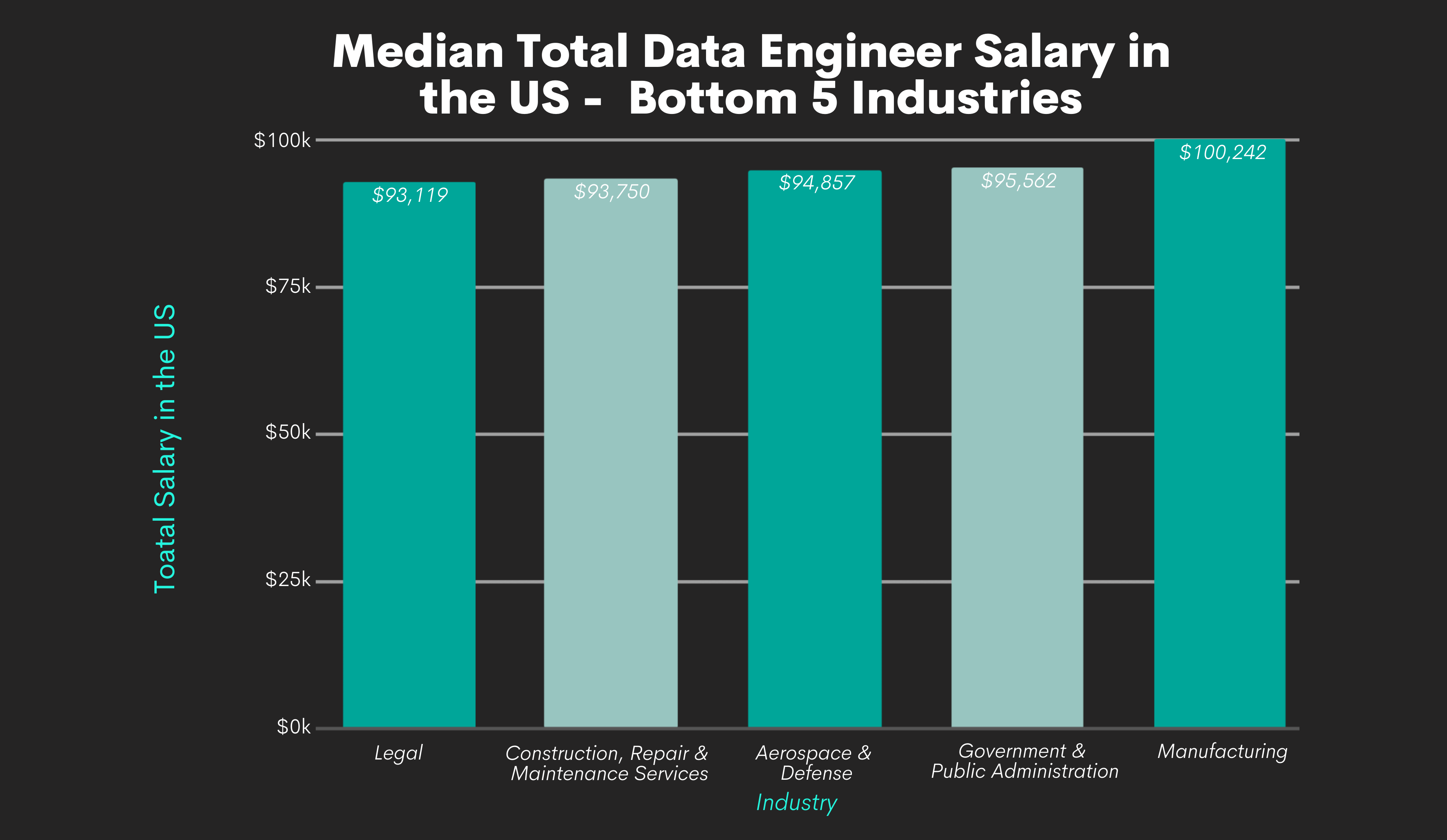
In four out of five of these industries, you won’t even reach $100,000 on average. The lowest paying industry is Legal, with $93,119. All other sectors have an insignificantly higher median salary.
The highest-paying is Manufacturing, with $100,242.
How about the salary range?
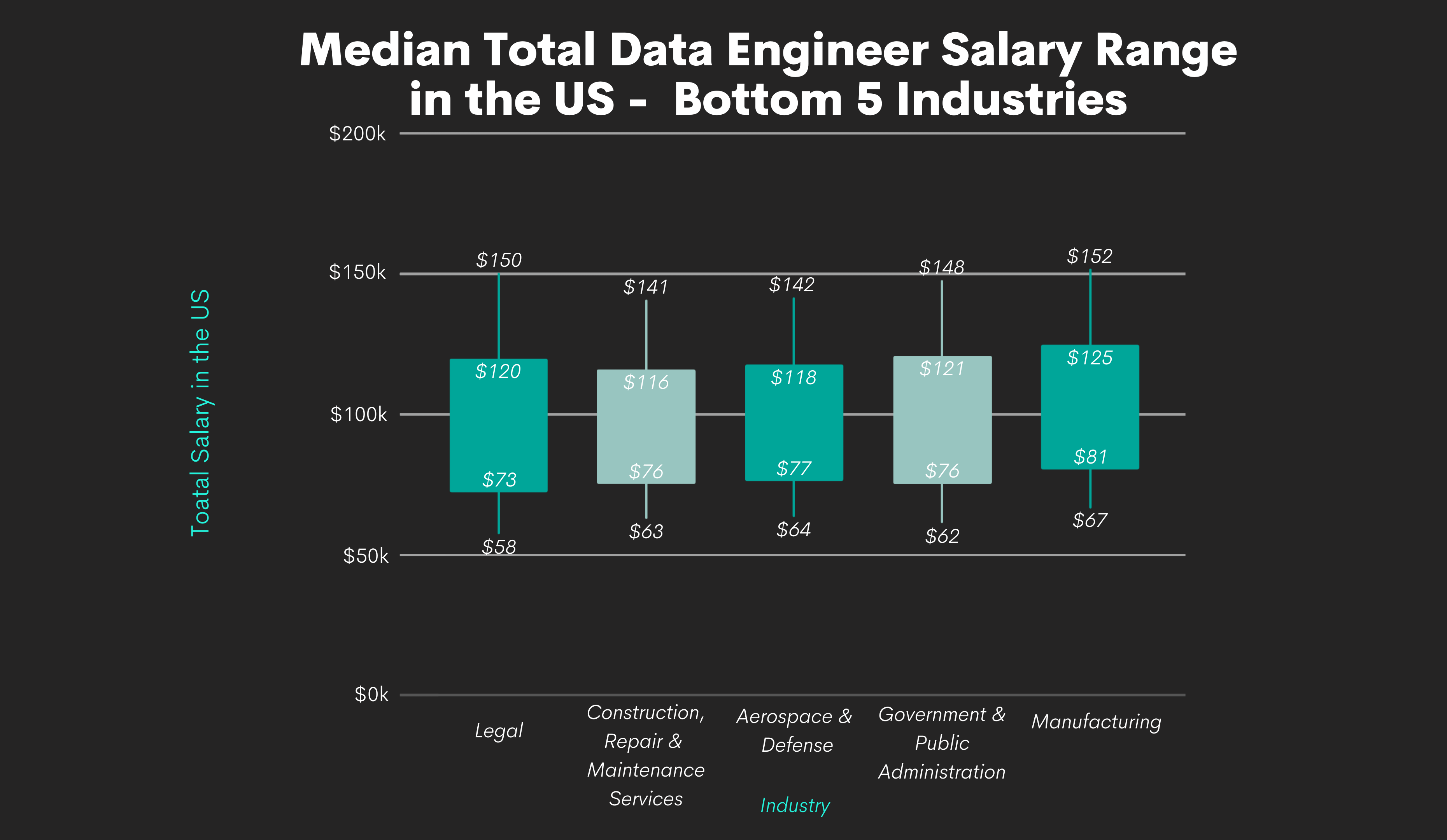
Here we have one unexpected development. Even though Legal is the lowest-paying on average, it offers the second-highest top-end. It also has the widest salary range of these five industries.
Data Engineer Salaries by Location
The location of the job (or company, if it’s remote work) significantly influences the expected salary. We will analyze the salaries by the US state and city. After that, we’ll go through each continent and see what salaries are for some countries.
Data Engineer Salaries by the US State
The first chart shows salaries in the top 5 highest-paying states for data engineers.
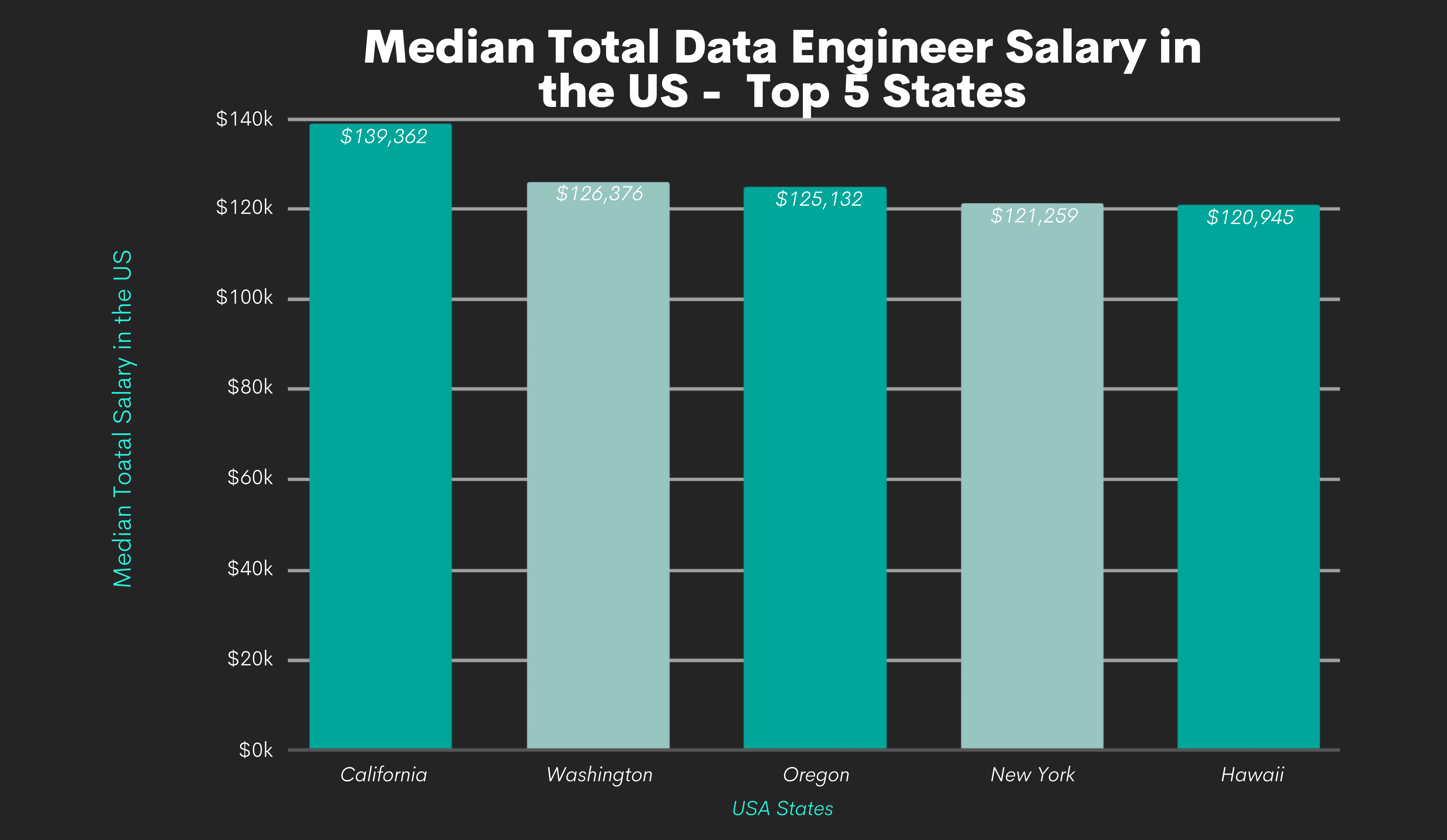
The highest salary is in California at $139,362. Salaries in all other states are above $120,000 but still rather significantly lower than in California.
Among the usual suspects, it’s surprising that Hawaii sneaked into the top five.
Now let’s look at the states with the lowest salaries.
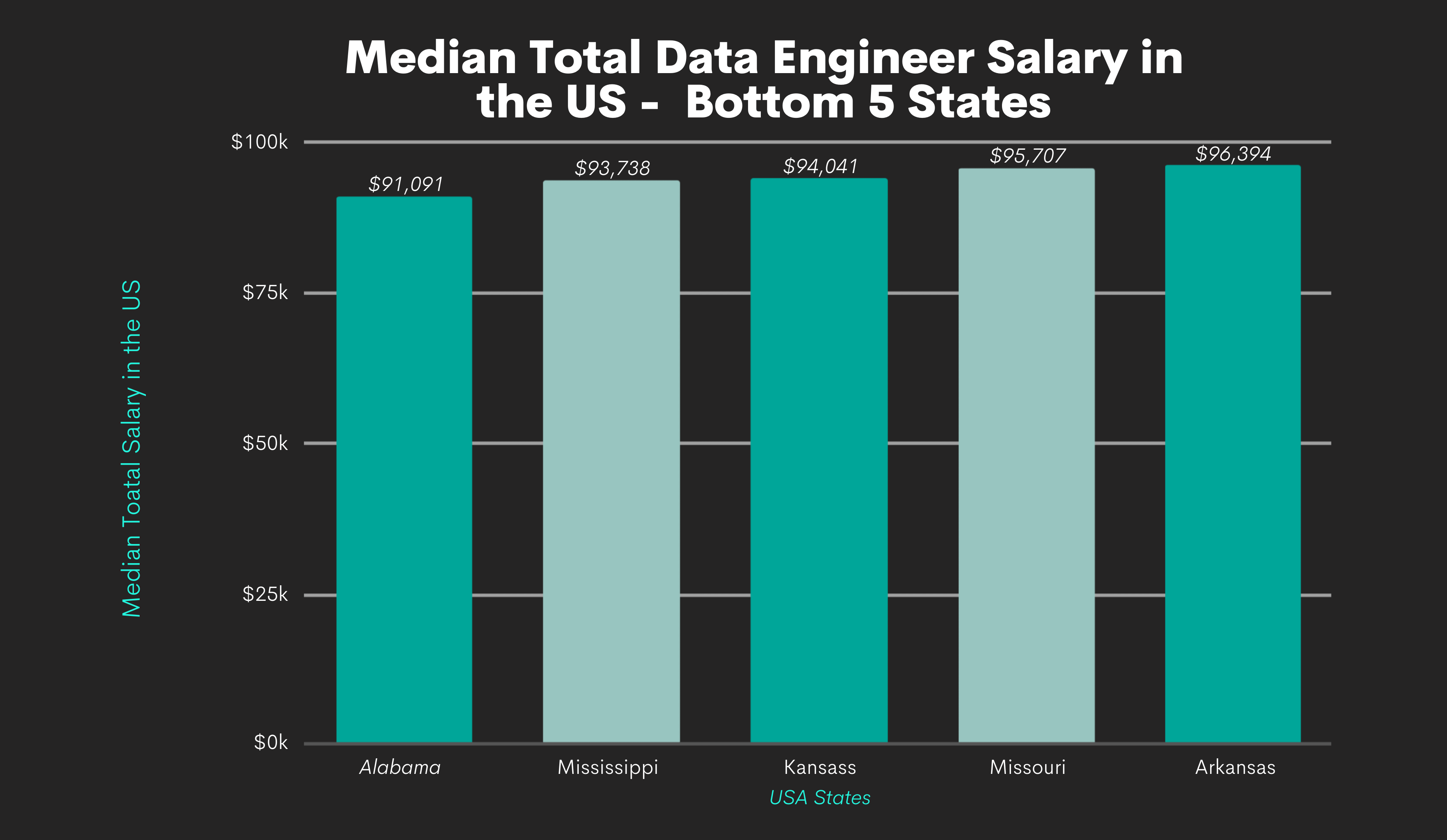
Alabama has the lowest salaries, with the median being $91,091. Mississippi is second from the bottom, so thank God for Alabama. Slightly higher salaries are in Kansas, Missouri, and Arkansas. Still, the salary doesn’t go above $100,000. This shows a wide crack between the US's highest- and lowest-paying states.
The location can get even more ‘micro’, so there are significant salary differences within each state, depending on which city you work in.
Data Engineer Salaries by City
It’s tempting to analyze cities by various criteria. But the idea is to give you a feeling of salaries, not to go down the analysis rabbit hole. So we will stick to showing you salaries for the ten most populous cities in the US. Big cities mean more work and, by proxy, more work for data engineers.
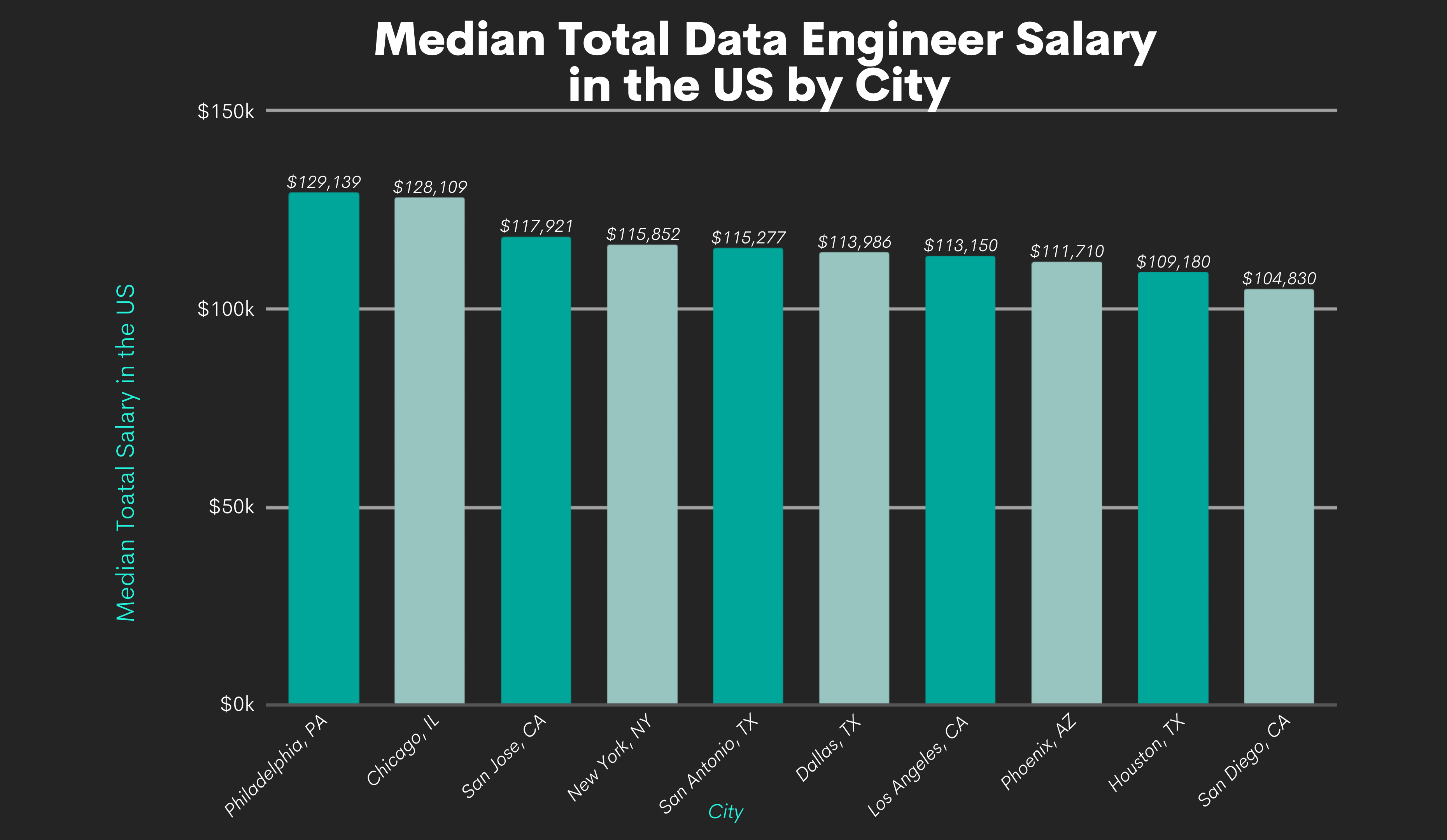
Philadelphia and Chicago are the highest-paying big cities in the US, with salaries little below $130,000. All other cities’ median salary for data engineers is significantly lower. The lowest salary of $104,830 is in San Diego.
Considering the US median salary for data engineers is $111,486, only the top five biggest cities have a median salary higher than the national data engineer median.
The salary itself doesn’t mean much if the living costs eat most of it. A good indicator of the costs is the apartment rent. We’ll take data from the above chart and compare it with the median rent for the one-bedroom apartment. The cities are again sorted from the highest to the lowest salary, like in the previous chart.
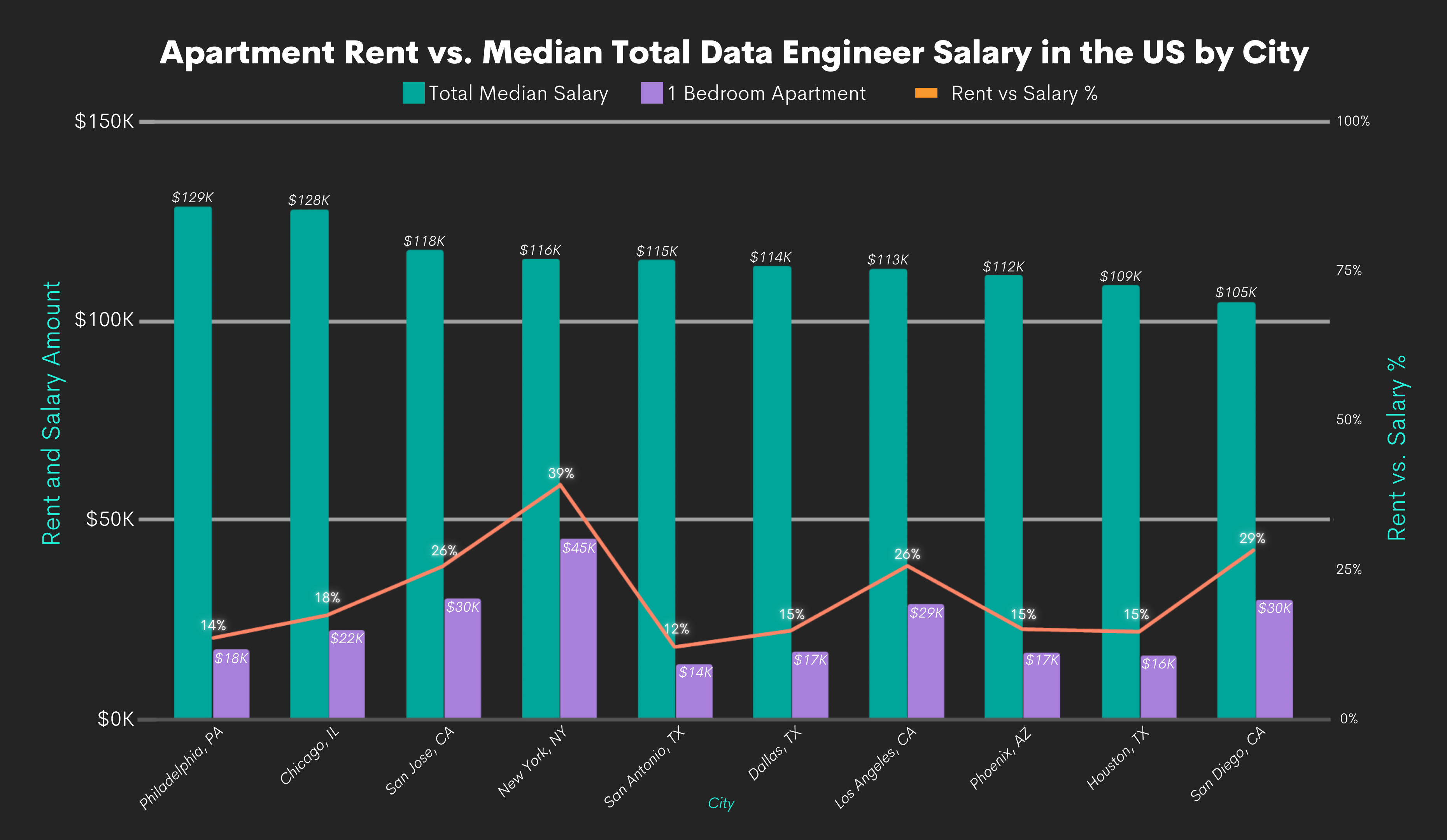
There are some interesting findings. The best percentage is in San Antonio – 12%
Philadelphia has one of the lowest rent costs and, with having the highest salaries, it has the second-best rent/salary percentage.
Even though they are in the bottom five cities by salaries, Dallas, Phoenix, and Houston have the third-best rent/salary percentage.
The worst is in New York due to high rent costs. San Diego is the second-worst city, with the lowest salary and one of the highest rents.
Data Engineer Salaries by Country
After focusing on the US, we should broaden our views and see what the salaries are in different countries on every continent.
Since we’re already here, let’s start with North America.
North America
Here’s data for the three biggest countries in North America.
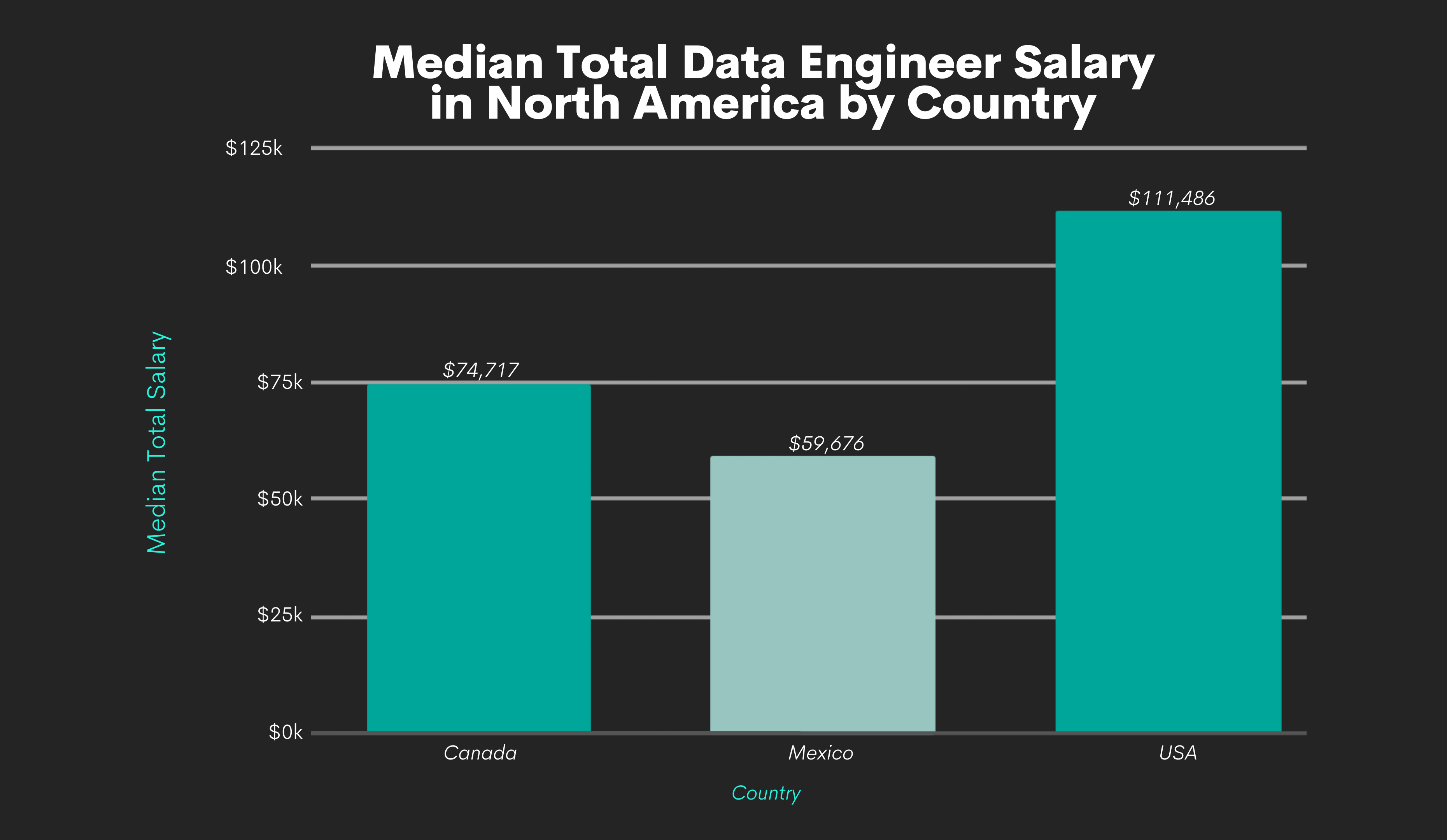
Unsurprisingly, the highest salaries are in the USA. However, it is somewhat surprising that the salaries in Canada are much lower than in the US. Mexico has the lowest salaries, as expected. Fun or not-so-fun fact: As a data engineer in Mexico, you will, on average, earn more than the average US worker.
South America
If you live in South America or planning to move there, you’d probably be interested in knowing what salaries you can expect.
We chose the five countries with the highest nominal GDP.
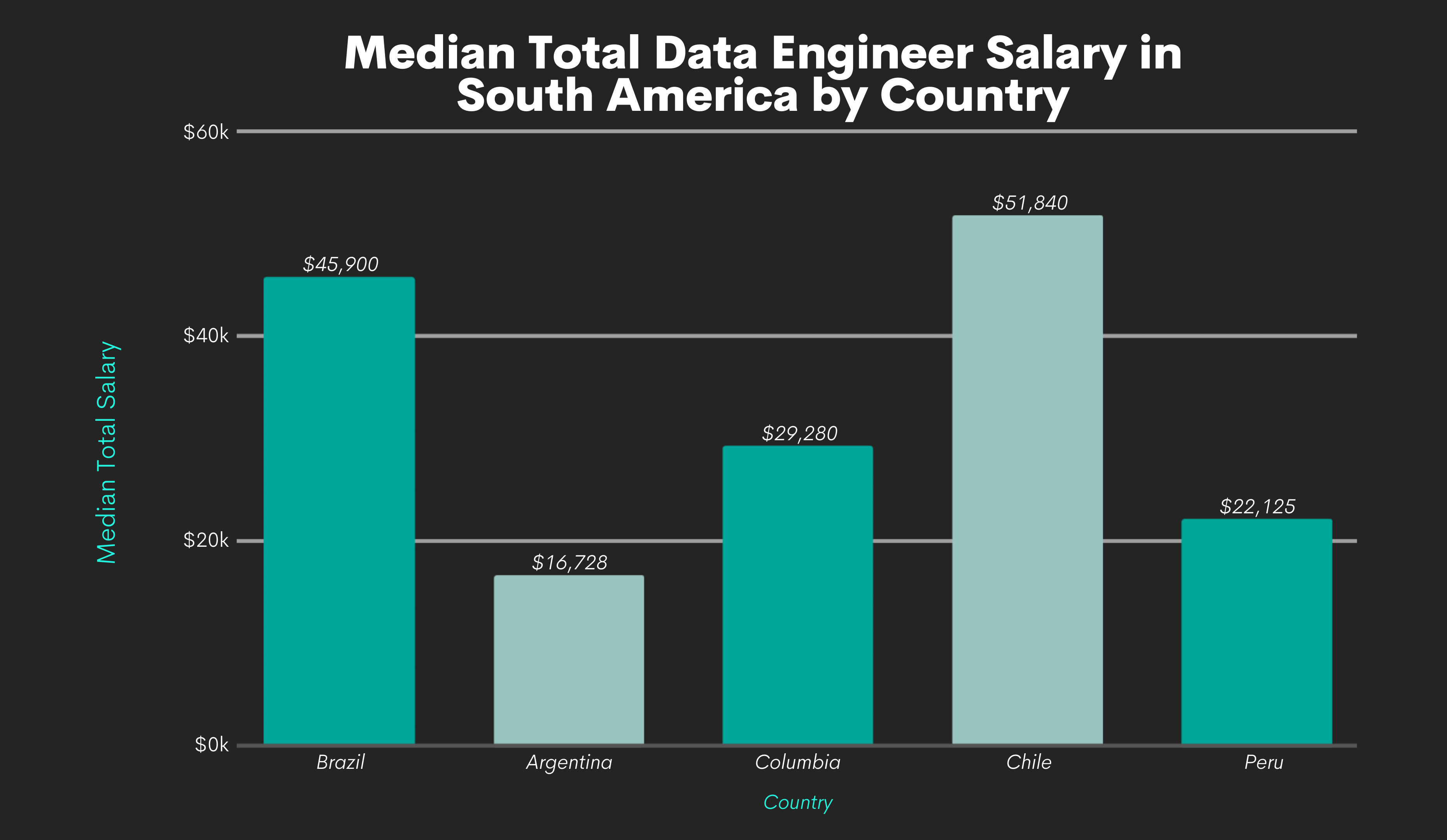
Of these five countries, the highest salary is in Chile, $51,840. Not far away is Brazil, with $45,900. Significantly lower are salaries in Colombia and Peru, with Argentina coming last.
Europe
Here’s the overview of salaries in the top ten European countries by nominal GDP.
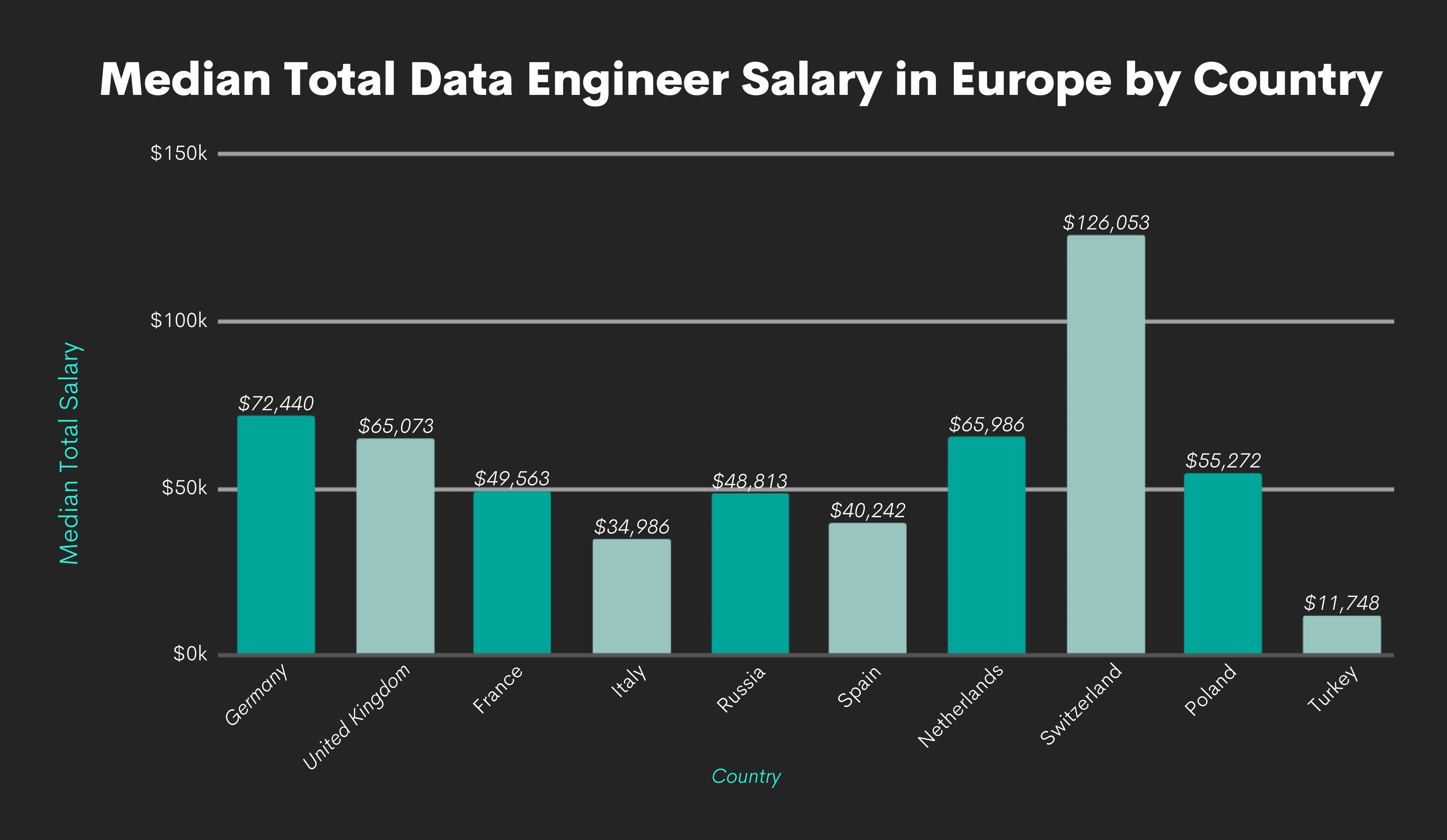
The highest salary is in Switzerland, at $126,053. Next come Germany and Netherlands with $72,440 and $65,986, respectively. The lowest salaries are in Spain, Italy, and, by far, Turkey.
Africa
To ensure the quality of data, we will show salaries only for the five countries with the highest GDP.
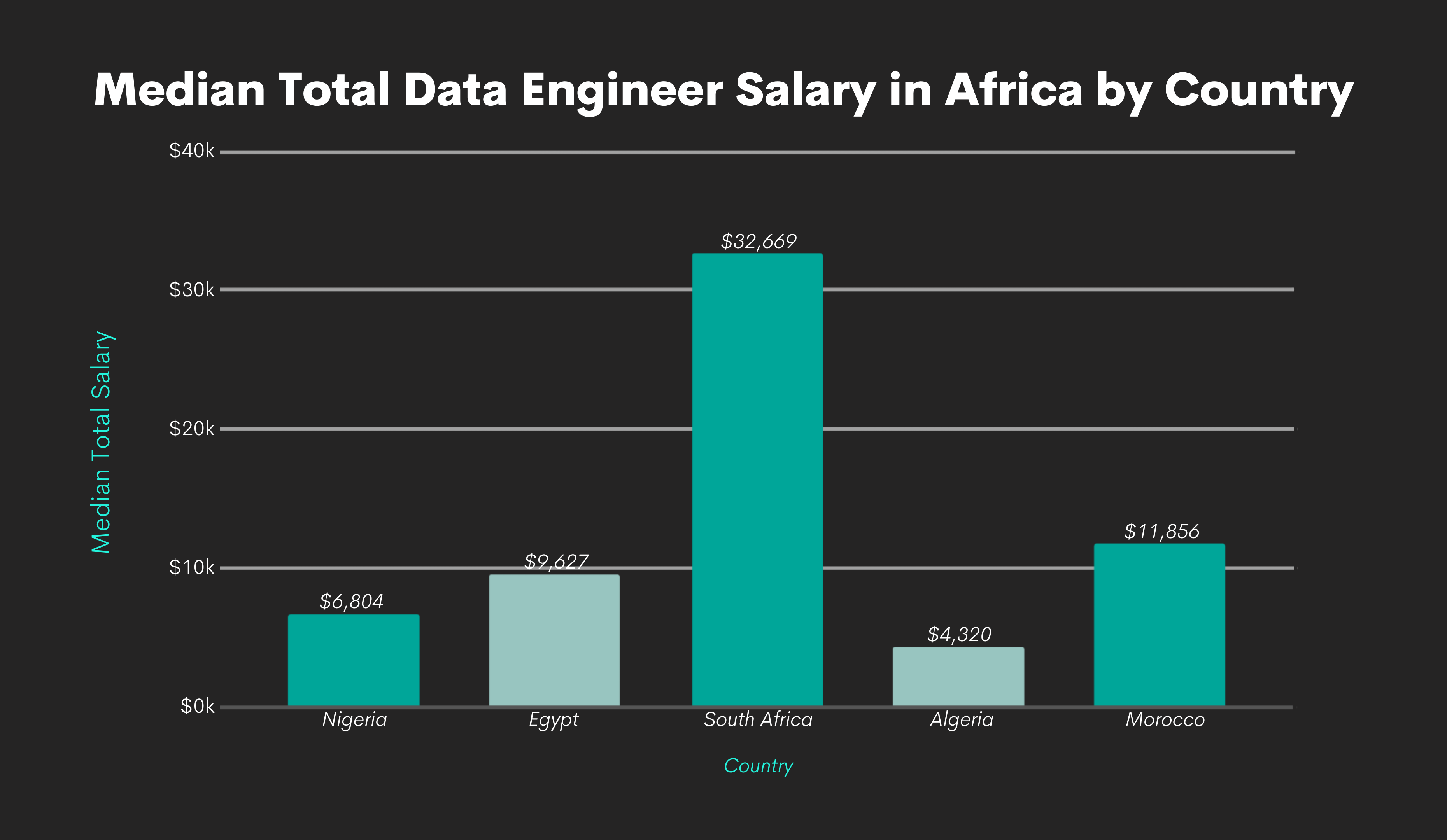
The highest salary of $32,669 is in South Africa. Next comes Morocco, the only other country with a salary above $10,000. The lowest salary of the selected countries is in Algeria.
Asia
Of the biggest Asian countries by GDP, Japan is the best for data engineers. The median salary there is $56,615.
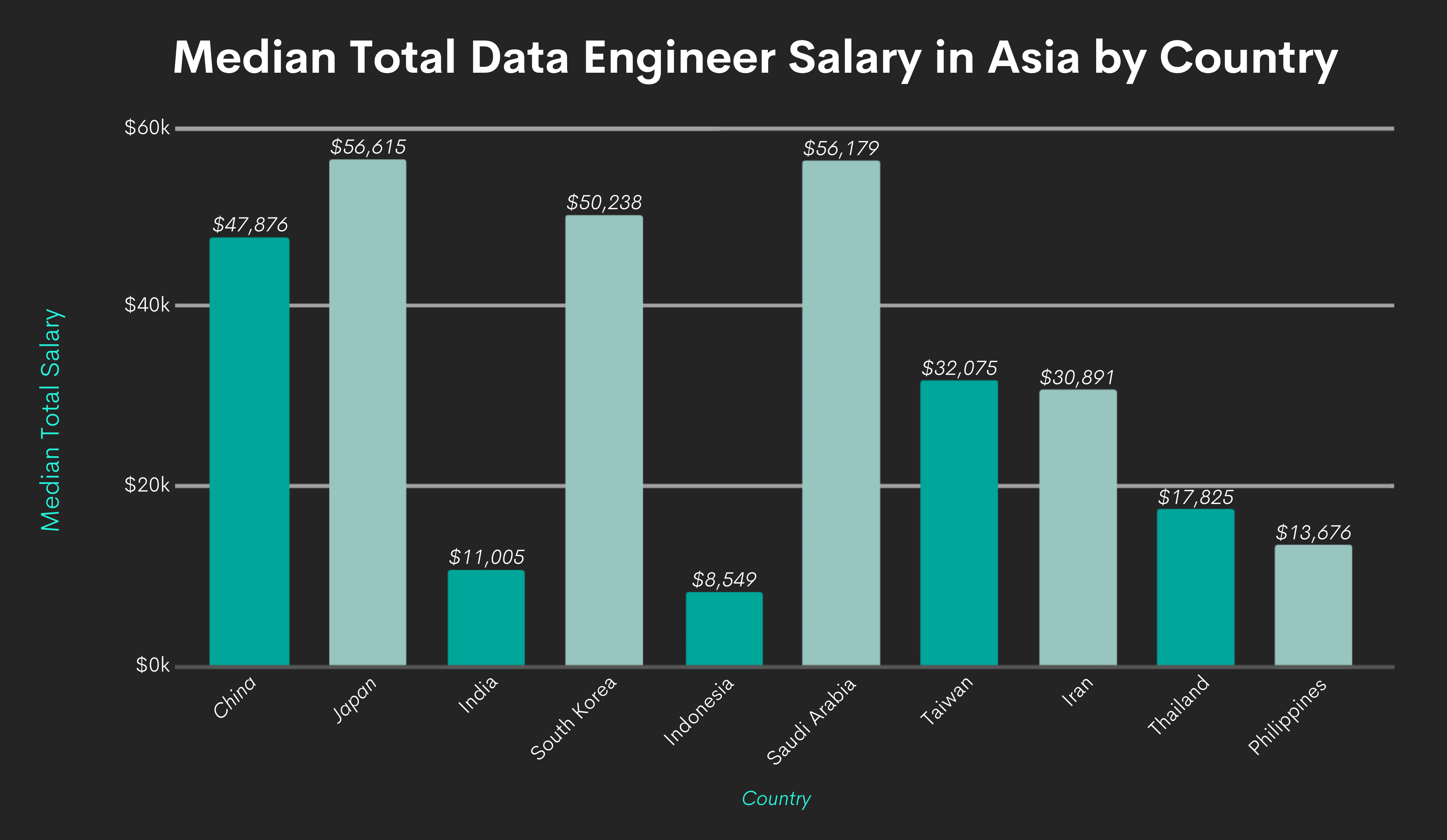
Slightly below is Saudi Arabia, while the third is South Korea, with a salary of slightly above $50,000. The bottom three countries are the Philippines, India, and Indonesia.
Oceania
Here we’ll show two economically most significant countries: Australia and New Zealand.
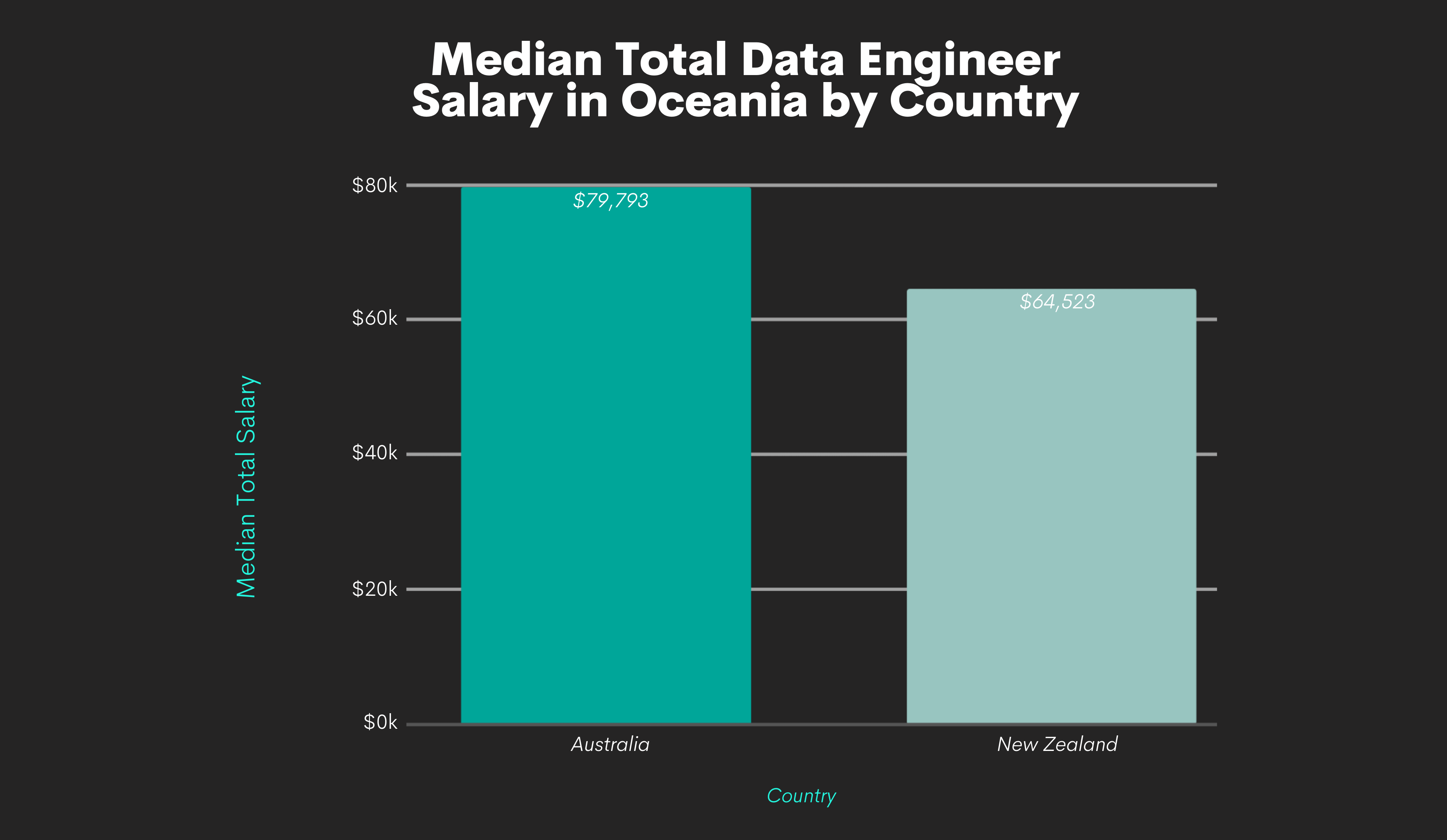
Australia pays a higher salary, which is slightly below $80,000. New Zealand’s median salary for data engineers is $64,523.
Data Engineer Salaries at FAANG Companies
FAANG are fancy companies that employ a massive amount of data professionals, including data engineers. Working at these companies comes with prestige and being at the forefront of technology development.
Let’s see how these companies pay.
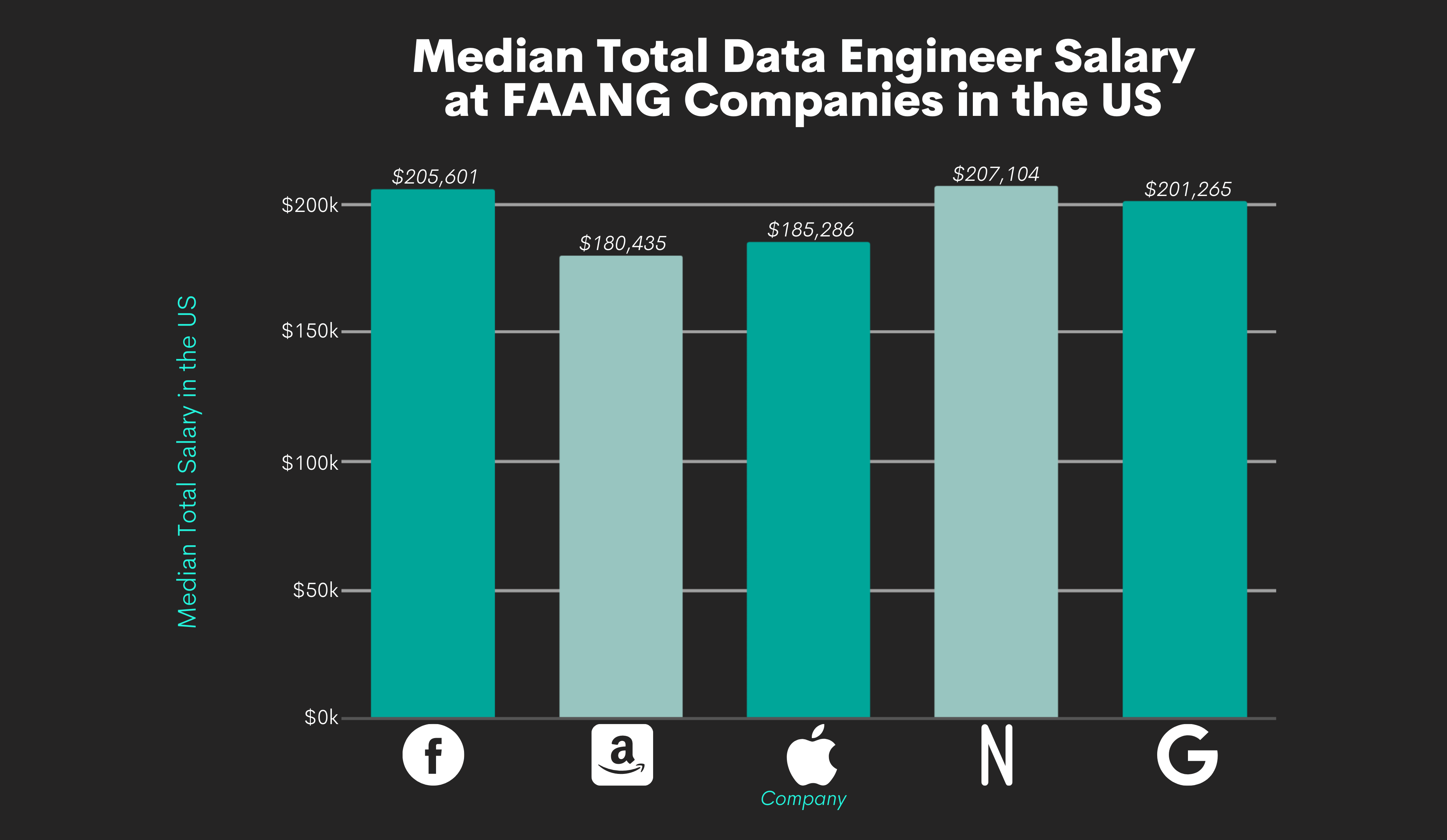
Seems you’re in for a lot of money if you get employed by one of these. Three out of five companies have median salaries above $200,000. The highest paying is Netflix at $207,104. Next come Meta and Google. If you’re interested in working at Google, but maybe as a data scientist, the Google Data Scientist Salary article has plenty of helpful information.
The lowest paying is Amazon, with $180,435. Apple salaries are not significantly higher.
Data Engineer Salaries at the Top Tech Companies
Working at FAANG doesn’t mean you’re working at the biggest tech companies. Actually, only Apple, Google, and Meta are among the top ten tech companies by revenue.
Let’s look at these companies selected using the 2021 revenue data.
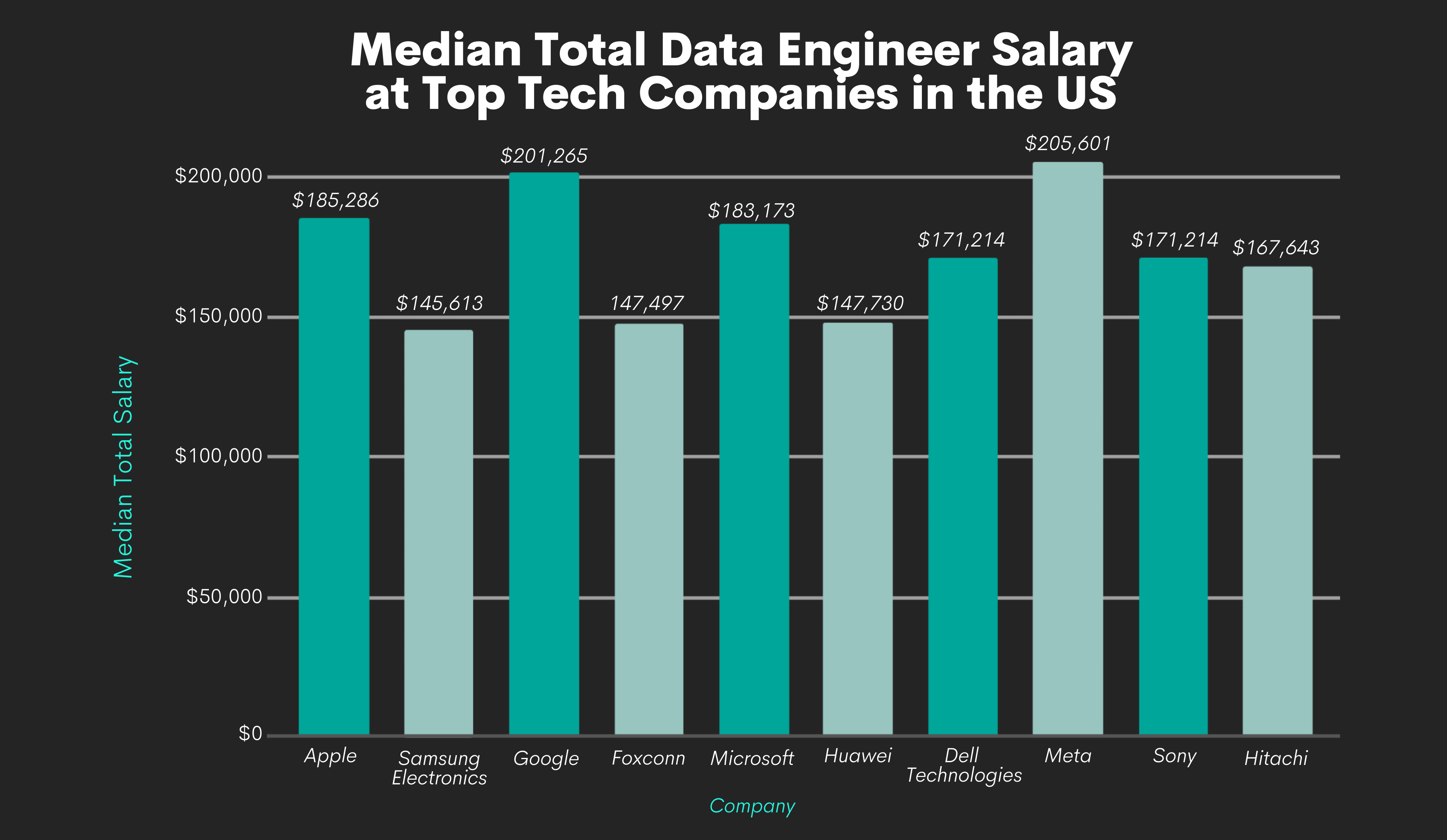
It seems FAANG is not only for show. The top three highest-paying companies are FAANG members: Meta, Google, and Apple. Microsoft, in fourth place, comes close. The lowest salaries are at Huawei, Foxconn, and Samsung Electronics.
Data Engineer Salaries at the Top Paying Companies
Now, let’s take a look at the highest-paying companies, according to Glassdoor.
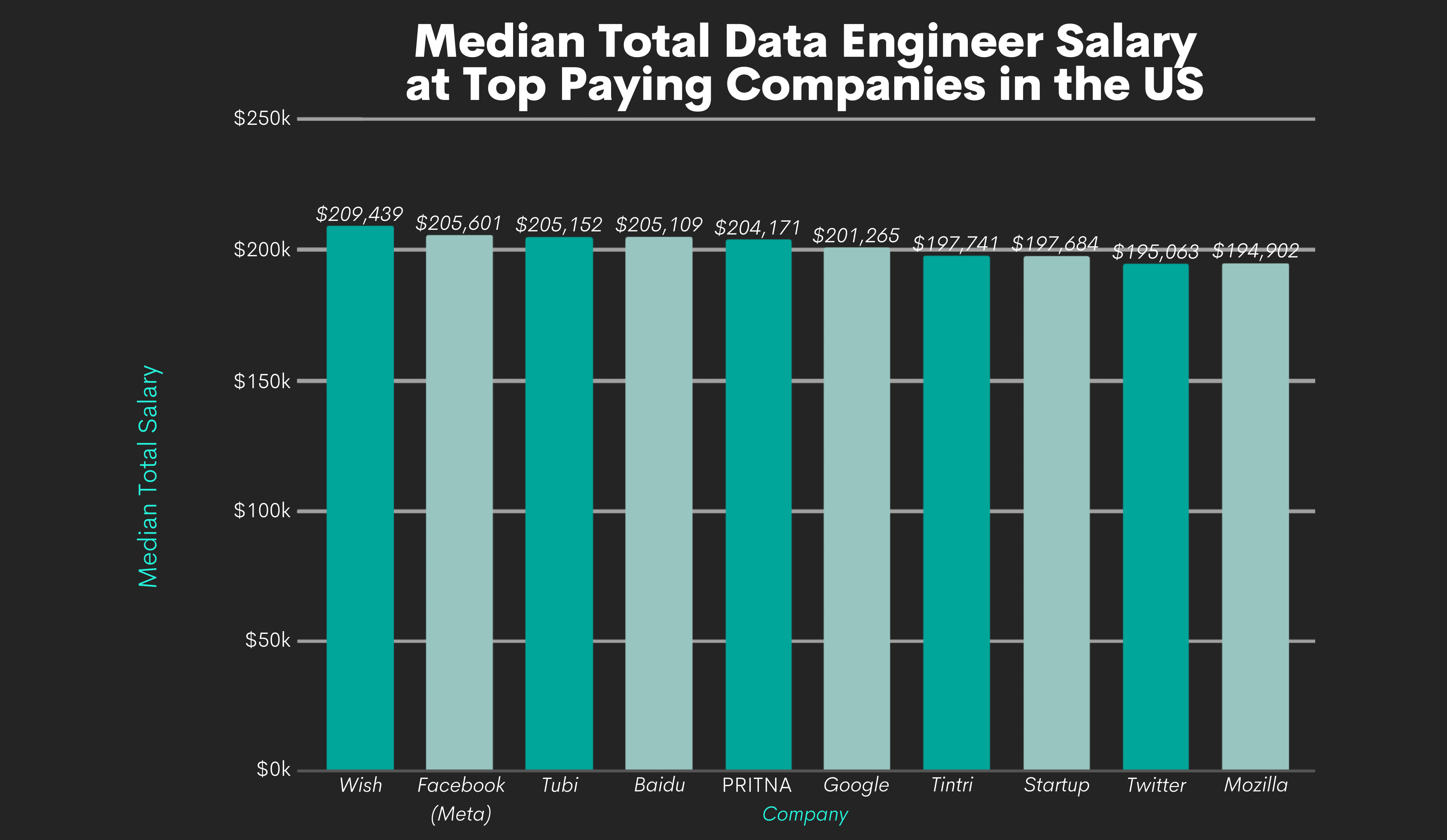
The data shows there are only two FAANG companies (Meta/Facebook and Google) among the ten top-paying companies.
The highest-paying company for data engineers is Wish; the median salary is $209,439. Next come Meta and Tubi. Even the lowest-paying companies offer salaries well above $190,000.
Those last three are Startup, Twitter, and Mozilla. Considering the havoc Elon Musk has been causing at Twitter recently, it’ll take some time (and probably something else) than salary for it to become an attractive employer again. There’s no use in a good salary if your employer goes bankrupt before the first payday.
Factors Affecting Data Engineer Salary
The above analysis shows how significant experience, location, and industry are for your salary.
However, there are also other factors:
- Education
- Skills
- Company Size
Education
As for any data professional, education is crucial for data engineers. Not only for earning more money but primarily for having solid foundations that allow you to do your job and learn more quickly.
You should have at least a bachelor’s degree in computer science or a similar technical field.
Of course, it’s not necessary to have formal education. It’s also possible that you learned everything on the job and, with experience, became a master data engineer. This is possible, but it’s also, for sure, a more challenging path.
So if you have a chance, get a degree in a relevant field.
What also can improve your salary prospects is data engineering certification. This especially goes for those without a formal degree. For example, you can acquire one of these certifications:
- IBM Data Engineering Professional Certificate
- Google Cloud Data Engineer Professional Certificate
- IBM Data Warehouse Engineer Professional Certificate
- Meta Database Engineer Professional Certificate
- DASCA Associate Big Data Engineer
- DASCA Senior Big Data Engineer
- Google Professional Data Engineer
- AWS Certified Big Data - Specialty
Skills
This is a no-brainer: the more skills you have and the more extensive they are, the better your chance to negotiate a higher salary. To be able to do that, you have to know which skills the data engineers are usually required to have.
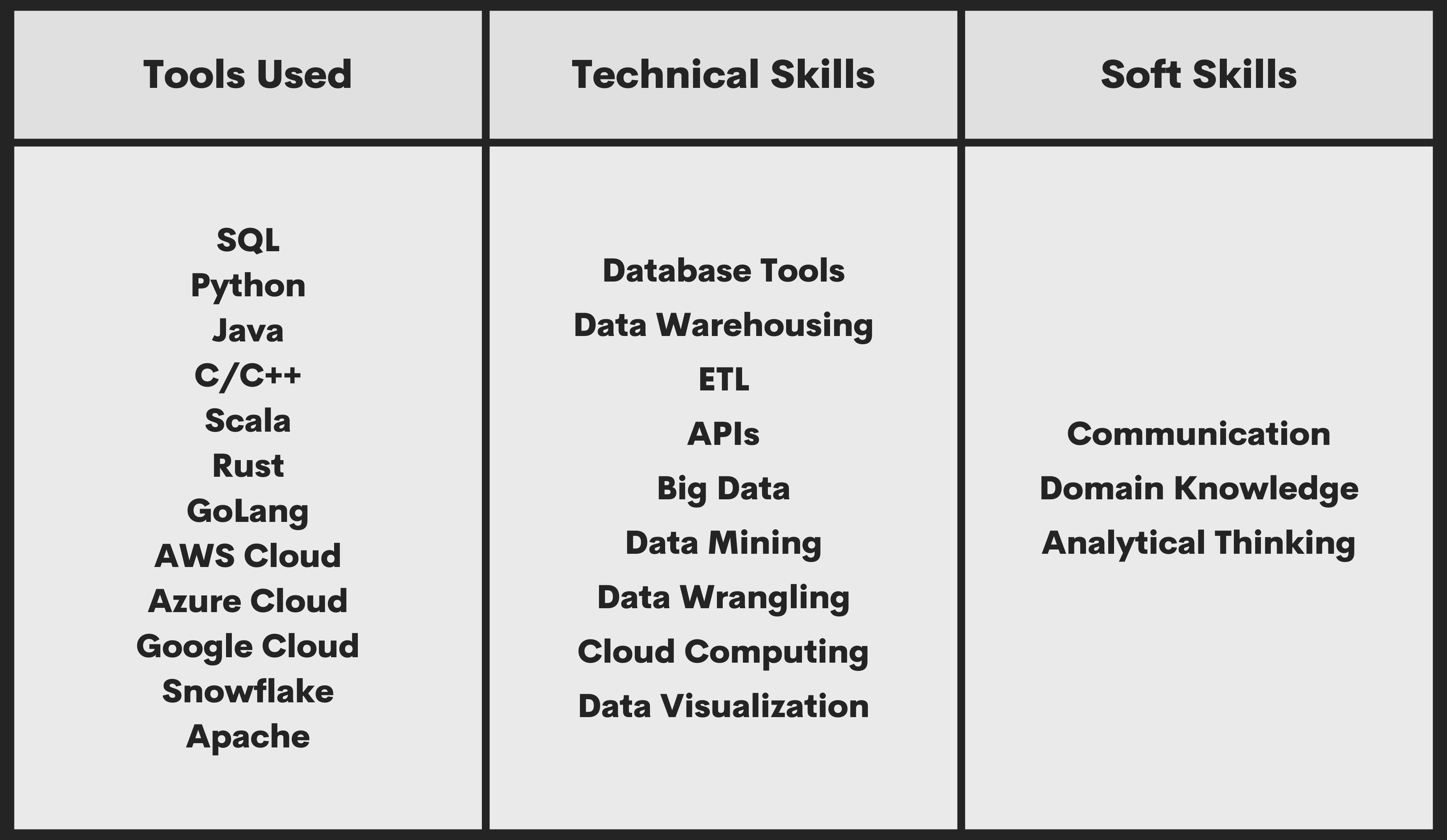
Company Size
The general rule is that bigger companies pay better. Bigger, in this case, means the employee count.
Let’s go back to the analysis of the ten top-paying companies. Only one of these companies could be considered a small one. All others are either medium-sized (3 companies) or big companies (6 companies). This is realistic. Overall, bigger companies pay better, but it’s not always the case.
Big companies tend to become rigid, with precisely defined salary ranges and structured ways of getting an increase. In smaller companies, your work can have a much more direct influence. If you’re outstanding and make significant contributions to a company's development, it’s pretty realistic you could negotiate at least equal or even higher salaries than in the big companies.
A Verdict: Is Data Engineering a Good Career?
Glassdoor's top list makes data engineering the number seven most desirable career in 2022. With reported high job satisfaction and currently open 11,821 positions, it seems an excellent decision to become a data engineer.
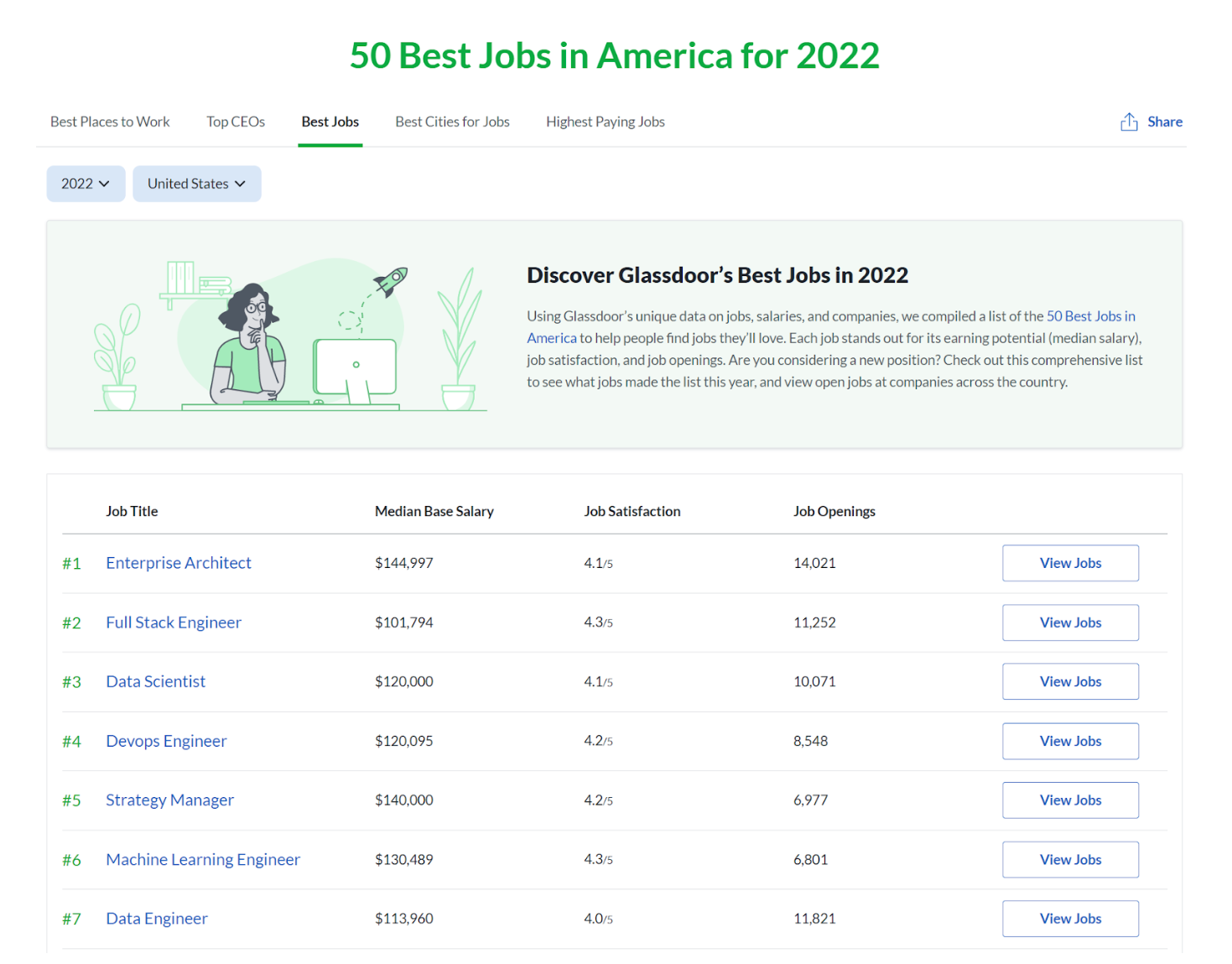
Take a look at the below graphic. The Dice Tech Job Report in 2020 has data engineering as the fastest-growing tech occupation.
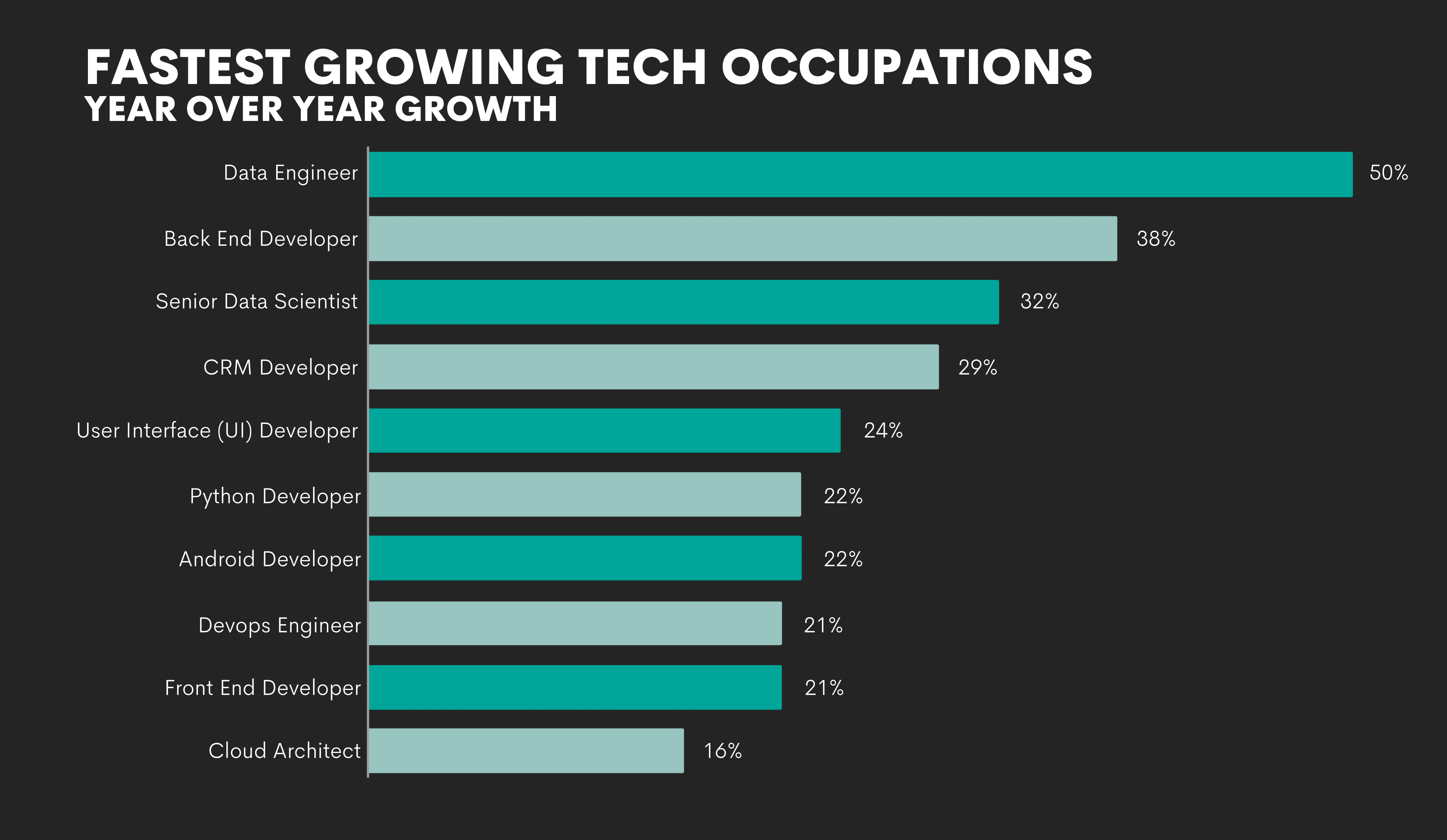
And there are no signs of slowing down.
We have already talked in detail about salaries. So we’ll just note once again that data engineering pays very well, with a $111,486 median salary.
If you love working with data and technology, and you want to be a software engineer, DevOps engineer, and data analyst all at once, then there’s no discussion – data engineering is ideal for you.
Another factor in the verdict might be the level of stress you could expect. Truth be told, all the jobs in data science are fairly stressful. The survey of 600 data engineers in 2021 showed that 97% feel burned out.
However, this also depends on the company, meaning how well it is organized and managed, the size of the team you’re working in and how the teammates help each other. Also, it depends on how you handle the stress.
It’s also expected. In today’s world, earning more money comes with a price tag. In this case, you’re paying your salary with long and irregular hours, which influences your work-life balance and, for most people, negatively influences their mental health in the long term.
This is also probably due to difficulties companies have in filling data engineering positions, leading to teams often being understaffed. Which, in turn, puts more pressure on the current employees. This is something that has to change in the future.
The final verdict is that data engineering is a career worth pursuing. Especially when you’re younger, want extensive experience, and establish yourself as a professional.
For many, it’s worth giving up some of your time, energy, and peace of mind. At least temporarily. So we encourage you to have a go at data engineering, but be conscious of all the ways this job can impact you negatively as a person. It’s a rewarding career but also very demanding.
Finding a well-paid job, where stressful situations are made easier by the company and its people, is possible. The decision is on you and what you value in life.
Summary
Being high in demand and offering more than hearty financial compensation makes data engineering an attractive (potential) career for most. To be successful in this career, you need adequate education, a set of skills, and a mindset.
Our interview questions can help you hone your SQL and Python coding skills. There are also articles with plenty of good career advice, interview preparation, and technical guides — for example, the “Data Engineer Interview Questions” and “Data Engineer vs Data Scientist” articles.
Share


